There were reports of bluebottles on two Phuket beaches on Tuesday as swimmers returned in numbers following heavy rain. But there were fewer bluebottles and they were smaller than at Nai Harn on Monday, a lifeguard spokesperson said. The reader who took these photos said: ''I counted more than 50 on the beach and many more washing up, most very small but a few bigger than I have ever seen on Phuket. Also counted 13 on the beach at Nai Harn.''
PHUKET: Lifeguards on their first day back on Phuket's beaches in seven weeks have closed the popular southern Phuket beach of Nai Harn because of big waves and a plague of bluebottles.
The jellyfish-like creatures have a single tentacle and a powerful sting. Also known as the Portuguese man o' war, the bluebottle has no means of propulsion and so is carried with prevailing tides.
A few have been sighted off Phuket in the past but never in large numbers. Unlike jellyfish, a bluebottle is not actually a single creature, but a colonial organism made up of many minute individuals called zooids.
Lifeguards hope to reopen the beach as soon as the plague has been carried away by the tide. No other beaches have been affected.
Marine biologists from the Phuket Marine Biology Centre have been contacted by the Nai Harn lifeguards and should be able to determine how soon the beach can be reopened.
The centre monitors jellyfish around the region. Phuket beaches do occasionally suffer from infestations and jellyfish are prevalent in surrounding waters to the north and south.
The dangerous and potentially deadly box jellyfish has been confirmed in sightings in Malaysia and occasionally in Krabi, but not so far on Phuket's popular west coast holiday beaches, which are exposed to strong tides at this time of the year.
Vinegar is considered to be the best treatment for jellyfish stings, particularly the box jellyfish, and first aid kits along the Andaman coast and on Phuket should include vinegar.
However, vinegar is not recommended for treating bluebottle stings.
After much research and public education from the Ministry of Public Health's Bureau of Epidemiology, the small island of Koh Mak in Trat province, recently became the first resort area in Thailand - if not in all of South-East Asia - to install life-saving first aid stations across all beaches in a bid to save the lives of anyone stung by box jellyfish.
Dr Potjaman Siriarayapon from the Bureau of Epidemiology; Dr Lakkana Thaikruea from the Department of Community Medicine, Faculty of Medicine, Chiang Mai University; and Dr Somchai Bussarawit the Director of the National History Museum in Bangkok, worked in co-operation with Koh Mak tourism industry leaders to create a system of strategically positioned first aid vinegar stations.
Advocates of preparedness say the system is simple and cheap. They hope it protects the island's reputation as a safe tourist resort by providing peace of mind to visitors.
It is also expected to inspire and motivate other popular tourist and non-tourist beach areas to implement similar protection - including on Koh Chang, Koh Samet, Koh Samui, Koh Pha Ngan, Railay, Krabi, Koh Lanta and Phuket.

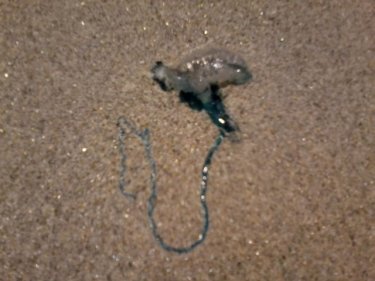






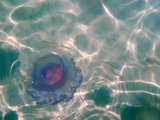

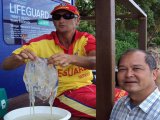
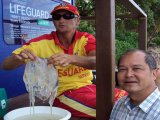
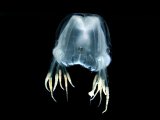

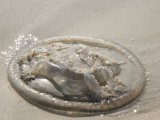
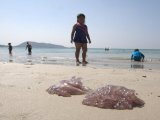






Vinegar is indeed the best treatment for jellyfish stings but as you state in the article the Bluebottles are not jellyfish.
Vinegar should NOT be applied to Bluebottle stings as it increases toxin delivery and worsens symptoms of stings from the nematocysts of this species.
Salt water, not fresh should be used to wash the affected area followed up if possible with hot water (fresh hot water is OK) at a temperature around 45 degrees C.
Dilute alcohol as can be found in most first aid kits can also be effective.
Posted by soupdragon on May 28, 2012 13:53